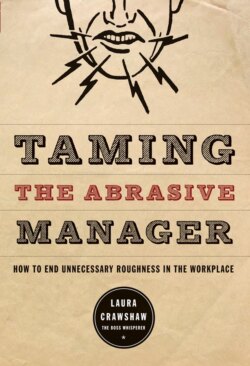Читать книгу Taming the Abrasive Manager - Laura Crawshaw - Страница 11
It Only Hurts When I Work
ОглавлениеSuffering is a term rarely applied in the workplace. It’s one of those emotionally loaded (also referred to as touchy-feely) words that seem out of place at work. Aren’t we supposed to leave our emotions at the door so we can get on with business? Workplace suffering? Employers don’t want to hear about it because they don’t want to be perceived as perpetrators of suffering—they’re there to get the job done, and social services aren’t part of that picture. Second, it’s a given that we all were meant to suffer at work—right? Showing up day after day to plug away at tasks we don’t necessarily enjoy with people we don’t necessarily like is a pain, a pain that most of us can’t afford to avoid. What lottery winner doesn’t jubilantly declare that his or her first act will be to quit work? Unless we are lucky enough to love what we do and the people we do it with, we endure the assorted discomforts of work to pay the bills and keep the wolves from the door. So since when isn’t work supposed to be painful?
Work can be painful for other reasons, including the actual nature of the work. Early man learned early on that woolly mammoth hunts were no picnic if you were the one who ended up trampled or impaled. And it seems pretty obvious that pyramid building was no easy task for your average Aztec or Egyptian laborer. As a kid I remember teachers warning us of the physical and mental suffering we would endure digging ditches or screwing caps on toothpaste tubes if we failed to hit the books. It’s not only the nature of the work that can be unpleasant or uninteresting, causing physical or emotional suffering—work can also hurt because of the circumstances surrounding our jobs: weak wages, bleak benefits, bad schedules, or looming layoffs. In short, work can be a pain.
But the pain of work itself is not the pain I’m addressing in this book. Nor am I talking about the pain caused by bosses who cut programs, pay, or people based on business need. I’m talking about the pain suffered from direct contact with an abrasive boss; the emotional wounds sustained from direct interpersonal aggression experienced in day-to-day interactions with abrasive bosses. And the suffering isn’t limited to abrasive bosses’ subordinates: all of their coworkers—subordinates, peers, and superiors alike—can be rubbed raw by the grinding force of disrespectful treatment:
‘‘He’s always talking down to people, interrogating them—‘Why didn’t you do this? Why didn’t you do that?’—he makes people feel like idiots.’’
‘‘Everyone feels helpless, hopeless, out of control.’’
‘‘She does what’s best for her—she doesn’t stand up for us, ever. If she’s questioned by management, she comes back and attacks without exploring the issue.’’
‘‘It leaves us feeling so unimportant—like we’re not worth anything.’’
‘‘We’re all afraid of him; he walks around, sees something that sets him off and starts yelling. It gets so tense—to the point where no one wants to even talk. It’s getting harder to come to work.’’
‘‘The best days at work are the days she isn’t here—that’s when we can breathe.’’
‘‘Working here reminds me of the time I was in an abusive relationship. I find myself thinking ‘What’s wrong with me? What am I doing wrong? What can I do differently?’ I’ve never had that experience in my work life until this new manager showed up.’’
‘‘I used to enjoy coming to work, but since she’s been here, all I can think about is finding a way to get out.’’
‘‘He’s not a team player. It’s never ‘we’; it’s always ‘I want,’ ‘I said.’ ’’
‘‘When he shows up, we shut up. We don’t tell him any more than we have to because you don’t want to bring up anything that will provoke him.’’
‘‘Her behavior shouldn’t be tolerated. We shouldn’t have to constantly walk on eggshells.’’
‘‘People get a sick stomach when he walks through the department.’’
‘‘It all boils down to respect—when you feel your efforts are appreciated, when you see some interest in what you’re doing, that’s respect. I can’t deal with the contempt, the ugly mood swings, his refusal to treat his team with respect.’’
